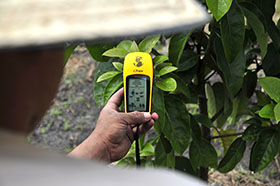Progress toward improving food security and nutrition depends on effective and efficient agricultural research and development. How can scientific discovery, technology development, and innovation for food security best be fostered? IFPRI’s policy research on science, technology, and innovation (STI) has addressed this question at the global level—creating international public goods (IPGs) that provide the underpinnings for context-specific policies. And at the regional level—where measurable impact can be achieved. Recently an external assessment by John K. Lynam examined the impact of IFPRI’s policy research on STI from 1995 to 2012.
Over this period, IFPRI’s work on STI has adapted in response to a changing decision-making environment. The earliest work looked at priority setting and returns to agricultural research. A seminal book, Science under Scarcity: Principle and Practice for Research Evaluation and Priority Setting, a related software system for calculation of cost and benefit streams, and use of geographic information systems allowed for targeting of priorities in the context of the geographical heterogeneity of crop and livestock activities. Working on the ground, IFPRI put priority setting into context for regional research programs. For example, IFPRI’s work for ASARECA (an Eastern and Central African research network) contributed to better planning and coordination for the region’s 17 research networks. However, the donor community’s shift away from funding networks and research organizations toward project-based funding and competitive grants limited the value of IFPRI’s earlier work on priority setting.
Moving away from priority setting, IFPRI’s researchers began a major program on genetic resources just as dramatic changes were underway in agricultural biotechnology and in governance thereof. The audience for policy work on crop improvement is small, but it is central to work of the CGIAR Consortium, and the potential scope for impact is quite large. IFPRI made a critical contribution to establishing the CGIAR gene banks’ role in global conservation of the world’s crop diversity, and to the creation of the Global Crop Diversity Trust, by providing cost estimates for the ex situ conservation of genetic resources in perpetuity. IFPRI also contributed to the global debate on in situ conservation, with a framework that defines possible approaches to this challenge—such as increasing the benefits farmers derive from genetic diversity—and their economic implications. Although this work did not have direct impact, the in situ conservation agenda has been carried forward by Bioversity. By ensuring that another organization had the capacity to take this work to impact, IFPRI was able to focus on generating new IPGs. Other work on genetic resources has focused on farmer demand for varietal traits and the implications for breeding; ex ante evaluation of the impacts of investments in biotechnology; and biosafety regulations for transgenic varieties.
Most recently, IFPRI policy research on STI has focused on agricultural innovation systems (AIS). AIS offers a new way of understanding the process of agricultural research and innovation—recognizing that these systems are nonlinear and complex. IFPRI contributed to the development of the AIS framework, which is premised on the hypothesis that AIS are not fully functioning in developing countries. Two areas of research were prioritized: How should individual entities, such as agricultural extension agencies, NGOs, and private sector companies, be organized internally to contribute to an evolving AIS? And what organizational innovations could improve interaction between different entities? IFPRI’s work on AIS has contributed to a change in thinking about innovation systems, which has been mainstreamed in CGIAR centers and programs. But impact on the performance of AIS has not been measured.
A broad range of potential research areas can be categorized as STI; choosing a research focus, however, involves making tradeoffs between IPGs and achieving measurable impact or accountability at country and regional levels. This dilemma emerges clearly from the evaluation of IFPRI’s STI policy research. Going forward, the evaluation recommends that IFPRI develop a better decision making framework for STI work, particularly for making choices between opening up new lines of research and extending research to impact. To achieve impact, the evaluation also recommends a more strategic approach to capacity strengthening that emphasizes policy research capacity in targeted developing country institutions—greater capacity would allow developing countries to make better use of IPGs. Partner engagement also is critical for moving from policy research to outcomes, as is reflected in IFPRI’s most recent strategy and increased deployment of personnel to country programs. STI policy research must continue to evolve too. As the IFPRI STI team explores the next strategic focus for its research, it faces the difficult question of how to balance the increasing emphasis on accountability—and therefore impact—with the ability of IFPRI to define new research areas and generate IPGs in this critical policy area.







